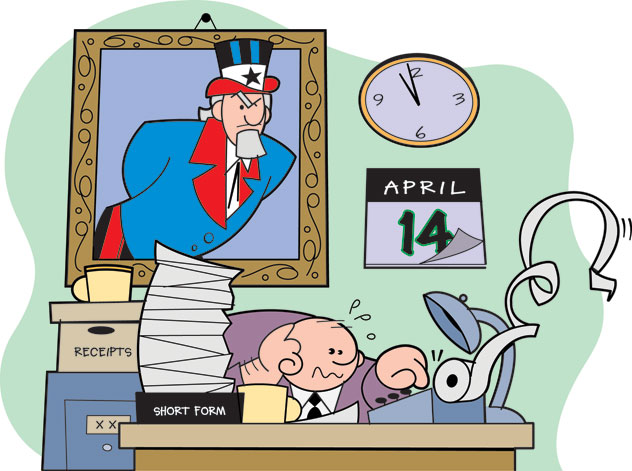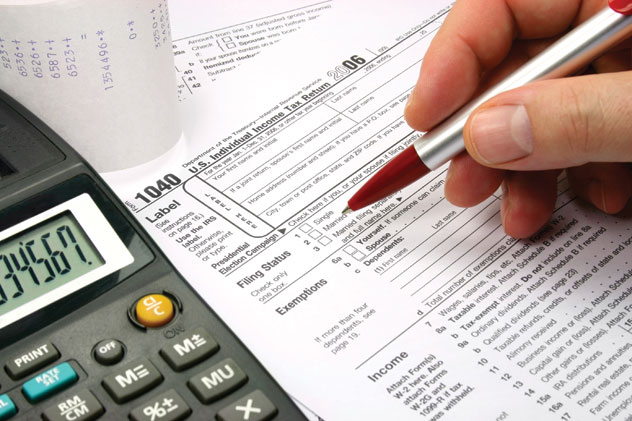FINANCE:
Maximum Refunds: Filing Your Taxes Right
The deadline to file taxes is nearing fast. Khorshed Alam talks about how to maximize the refunds on your tax returns.

Good Recordkeeping: Get an early start on your tax return filing. Maintaining good records can make filing your tax return easier, and help you to not miss any taxable transactions you made during the year, which will help you reduce your tax liability. Here are a just few steps to ensure good recordkeeping.
You should keep all documents that may have an impact on your tax returns, leading to more legitimate deductions and less tax liability.
Keep your records in a safe place. You may like to organize them by year and type of income or expense, or keep all records related to a particular item in a designated envelope or folder.
Keeping organized records ensures you can answer question if your return is selected for examination or prepare a response if you receive a notice from the taxing authorities.
You should normally keep records relating to property for at least seven years after you sell or otherwise dispose off the property.
If you are a small business owner, you have to keep all your employment related tax records for at least eight years after the tax becomes due or is paid, whichever is later. Examples of important documents business owners must keep include:
Gross receipts: Cash register tapes, bank deposits slips, receipts books, Invoices, credit card charge slips and Form 1099-MISC.
Proof of purchases: Cancelled checks, cash register tape receipts, credit card sales slips and invoices.
Expense documents: Cancelled checks, cash register tapes, accounting statements, credit card sales slips, invoices and petty cash slips for small petty cash payments.
Documents to verify your assets: Purchase and sales invoices, real estate closing statements and cancelled checks.
Keep all the documents in a folder and label it with the corresponding year.

Gather Tax Documents as You Receive them by Mail: Save all documents you receive in the mail or from the employers as they contain information that you will need for tax return preparation. Take a moment to review each document as it comes in so that your tax preparer can correct discrepancies well before he/she starts preparing your tax return. If there is a mistake, getting a corrected W-2 or 1099 form can take time, so don’t wait until the last minute. Typical forms you will receive may include:
• W-2’s from your employers
• 1099-MISC forms for self-employed income
• 1099-INT (interest) and 1099-DIV (dividend) forms
• 1099-G Tax refunds and unemployment compensation
• 1099-B forms showing brokerage trades in stocks and bonds, along with statements showing when you bought and sold your investments
• K-1 Income and deductions from partnership, S corporations, trusts, and estates
• 1099-SA form showing Social Security received
• 1099-R Distributions from pensions, annuities, retirement or profit sharing plans, IRAs, insurance contracts, etc.
• Proof of jury duty pay
• Proof of alimony you received
• Records of income and expenses for your rental property
• Records of income and expenses for your self-employment
• Scholarships and fellowships
• Prizes and awards
• Gambling and lottery winnings
Income from Sources Outside the United States: List all income received from foreign banks/financial institutions to report interest income. You will have to complete the Report of Foreign Bank and Financial Accounts (FBAR) (Form TDF 90.22.1) for individuals having a combined balance over $10,000 at anytime during the year.
In addition, single taxpayers with financial assets of $50,000 and over in one year need to complete Form 8938 to be in compliance with the Foreign Account Tax Compliance Act (FATCA). For those that are married filing jointly the requirement of financial assets is $100,000 and over in one year.
Additionally, all other income sourced outside the United States (e.g. rental, dividends, interest, etc.) are required to be reported as world income. Recently, the taxing authorities have become very diligent in assuring that the taxpayer is in compliance with reporting of income from outside the United States and financial assets held overseas.
Itemize Deductions: The personal exemptions and itemized deductions phase-out is reinstated for 2012 at a higher threshold of $250,000 for single taxpayers, $275,000 for heads of household, and $300,000 for married taxpayers filing jointly. To get all the possible legitimate deductions, go through all your checkbooks, credit card statements and receipts for cash purchases. Itemize expenses into medical, union dues, mortgage interest, real estate taxes, charitable donations, unreimbursed work-related expenses, personal property taxes (i.e. DMV license fee), and any other expense, which might be applicable in your case. These documents may include:
• Health care expenses (doctors, dentists, insurance, eye care, medicine)
• Real estate taxes
• Motor vehicle registration (Vehicle License Fee - VLF)
• Mortgage interest paid (1098)
• Home equity loan interest
• Gifts to charities and churches (monetary and other)
• Last year’s tax preparation fees
• Unreimbursed job related expenses (union dues, job education, uniforms)
• Loss of property (casualty or theft)
• Gambling losses (to the extent of winnings)
• Contributions to your traditional or SEP-IRA
• Qualified moving expenses
• College expenses (Student loan interest 1098-E)
• Daycare: child or adult costs
• Rental property expenses
• Alimony paid
• Adoption expenses
• Job-hunting expenses
• Investment expenses
• Unreimbursed business or volunteer work expenses
If you paid estimated taxes, keep a summary of your federal and state estimated payments and canceled checks. Other documents that may be helpful are:
• HUD-1 Escrow statement for property you bought or sold
• Summary of educational expenses (college tuition)
• IRA contributions (traditional, SEP, or rollovers)
Schedule Your Tax Appointment Early: Try to schedule your tax appointment as soon as you get most of the documents in mail. You may need to chase down missing records or resolve other problems later, before the April 15 filing deadline.
(The above information is of a general nature and should be treated as such and should not be acted upon in your specific situation without professional assistance or advice.)
|